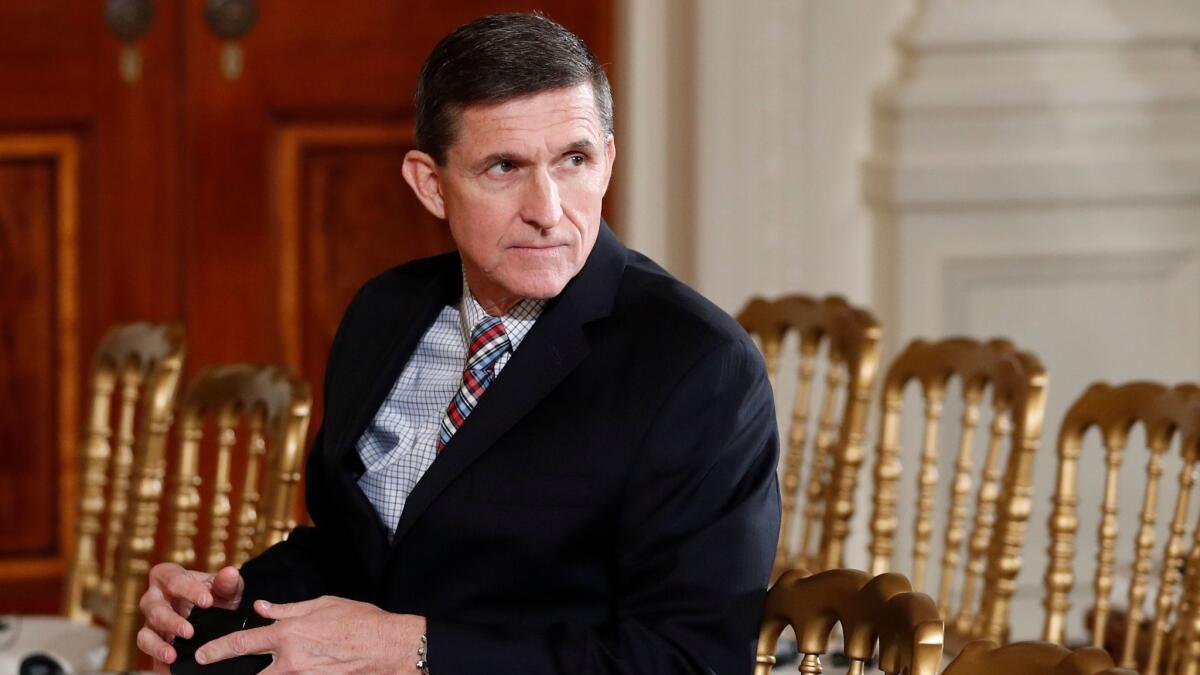Op-Ed: Leaks, like the ones that did in Michael Flynn, are a great American tradition

His national security advisor had to resign after falsely denying secret talks with Russia. His White House aides splintered into warring factions. His courtiers gossiped publicly over whose head was next to fall. So what made President Trump angriest when he got out of bed Tuesday morning?
Leaks.
“The real story here is why are there so many illegal leaks coming out of Washington?” the president tweeted. “Will these leaks be happening as I deal on N.Korea etc?”
The answer, Mr. President, is yes. The leaks are certain to continue — and thank heaven for that.
The U.S. government is a notoriously leaky collection of institutions. It’s been that way for decades. “The ship of state is the only known vessel that leaks from the top,” James Reston of the New York Times wrote in 1946.
Leaks don’t generally involve secrets that endanger national security. Instead, they fall into two relatively harmless categories: positive leaks to make politicians look wiser than they really are, and negative leaks designed to make rivals look bad.
Trump knew for more than two weeks that Flynn had misled Pence and Spicer, but did nothing about it.
More potent is the whistle-blower leak: the leak that happens when a government official believes something wrong is going on, but can’t find a way to stop it through normal bureaucratic means. That’s what appears to have happened in the case of retired Gen. Michael Flynn.
Flynn talked with the Russian ambassador in December, just after President Obama imposed sanctions on Russia to retaliate for the hacking of U.S. political organizations (including the Hillary Clinton campaign).
David Ignatius of the Washington Post reported on the conversation in mid-January — raising the question of whether Flynn had improperly negotiated over sanctions before Trump’s inauguration. Flynn told Vice President-elect Mike Pence and Trump spokesman Sean Spicer that the sanctions never came up in his talks. Pence and Spicer repeated the denials in public.
But that wasn’t true.
On Jan. 26, the Justice Department told Trump’s White House counsel that Flynn’s version was untrue — and that the apparent deception could make him vulnerable to blackmail from Russia. Still, Flynn continued to deny the report.
Then, on Feb. 9, the Post reported that nine current and former officials said Flynn’s version was untrue. On Feb. 12, the Post added the possibility of Russian blackmail into the mix. On Feb. 13, Flynn resigned.
Two items jump out from that timeline. One is that Trump knew for more than two weeks that Flynn had misled Pence and Spicer, but did nothing about it. The second is the unusual number of sources in the Post’s Feb. 9 article: “nine current and former officials who were in senior positions” at the time of Flynn’s phone call.
That’s not a leak; that’s an insurrection.
As Trump tries to remake Washington in his own image, it seems he’s going to run into plenty of national security bureaucrats who won’t merely be reluctant to cooperate; they’ll be ready to blow the whistle if the administration does something they consider improper.
That’s far from unprecedented.
In the Watergate scandal that brought down President Nixon, many of the most important leaks came from “Deep Throat,” a source who turned out to be Mark Felt, an associate director of the FBI. His motive, it appears, was to stop Nixon from turning the bureau into a politicized arm of the White House.
In the Iran-Contra scandal that entangled President Reagan, many of the leaks about illicit weapons deals came from the national security bureaucracy, too — some from officials who thought Reagan’s secret arms sales to Iran were a bad idea, others from officials who thought the National Security Council staff had exceeded its authority.
Trump’s leaks haven’t only come from national security bureaucrats, however; his White House staffers are prone to gossip, too, sharing — for example — details from his telephone calls with foreign leaders. Those leaks indicate factional spats.
One set of leaks charged that aide Stephen K. Bannon intervened to make sure the immigration ban was applied to permanent residents, an unpopular feature that was later reversed. Others charged that Trump was unhappy with White House Chief of Staff Reince Priebus over the chaotic rollout.
In the Flynn case, leaks have already had consequences beyond the general’s resignation.
Influential Senate Republicans have said they plan to insist on a full investigation of Russia’s activities during the presidential campaign. The FBI, moreover, is still considering whether Flynn broke any laws. And the Army is looking into whether he received money from the Russian government, which would violate military regulations.
Trump is likely to order a leak investigation, and Republicans in the House say they want to investigate the leaks as well. But if history is any guide, they’ll have a hard time finding a culprit — or, if they find one, in proving a case. The leaks will continue. For some bureaucrats, they’re a matter of institutional survival. For a few, they’re a matter of honor. In a well-run, self-policing government, they wouldn’t be necessary. But in the Trump administration, they’re likely to be more important than ever.
Twitter: @doylemcmanus
Follow the Opinion section on Twitter @latimesopinion and Facebook
More to Read
A cure for the common opinion
Get thought-provoking perspectives with our weekly newsletter.
You may occasionally receive promotional content from the Los Angeles Times.







